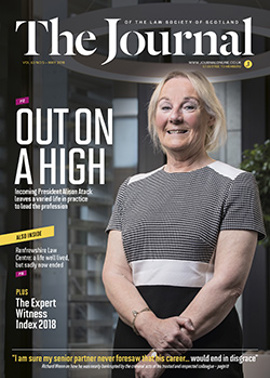The Death of a Law Centre

Now that I’m jobless for the first time in over 20 years, I’m making good use of my downtime by catching up with some of the cinema that I missed last year owing to my erstwhile weighty work-life balance.
This includes the excellent, if shamelessly grim, The Death of Stalin. Thus, I feel minded to expand my idleness towards a screenplay foray of my own, inspired by that satire of fellow Glaswegian Armando Iannucci, and by my experiences as principal solicitor of Renfrewshire Law Centre RIP. Maybe I’ll send him the treatment for it, as they say in movie-speak: The Death of a Law Centre. It could be a thematic sequel, and perhaps Steve Buscemi could play me as a small-time Nikita Krushchev. Or would the mischievous Mr Iannucci rename it Sod’s Law, and recast Simon Beale to play me as a latter day Beria? For we know what became of him!
Death by cuts of thousands
Renfrewshire Law Centre officially shut its doors to the public on 29 March this year. It was a sombre day. When I was appointed as principal 11 years earlier in 2007, the future looked bright. Then, a few weeks later, the global economy collided with an iceberg in the shape of the Northern Rock. I suppose many private firms foundered much sooner in the resultant tidal wave. Our death was slower, one of multiple cuts.
Thus, whereas in my first year, total turnover was in the order of £400,000 (in today’s terms), over the years we saw our funding whittled away by austerity, and between Christmas and Hogmanay last year, Renfrewshire Council announced that core funding was to be reduced to a humbug £95,000. Moreover, the funding model would move from a grant model to a competitive public procurement process.
Competitive public procurement may be all well and good for roofing contractors and the like, but for the sole niche legal services provider in a single geographic area with only one “customer” (the council), one might query the wisdom of such a process. Continual delays and uncertainty surrounding our future led to a situation where we didn’t know if we would still be there from one month to the next. And in so oppressive an environment, it’s simply not professionally responsible to agree to take on potentially long-term litigation.
We found ourselves having to turn away good business from needy clients, a lot of them. And that’s what’s so galling about it. By the time of our closure, there was probably more demand for our services than ever I remember before.
Labour of love
I loved the Law Centre, and I loved my 11 years there. It was the best job I ever had, and maybe that I’ll ever have (prospective future employers excepted, of course, ahem). Back when funding remained adequate, we could afford a team of lawyers, each possessing various particular legal interests and aptitudes from housing to employment or from social work to judicial review. I personally put three young lawyers through their traineeships, all of whom have gone on to pursue careers in their own areas of intrigue.
For most of my time there I lived just over the county border, and 14-hour days and seven-day working weeks were not uncommon. My two children were born in the local Royal Alexandra Hospital, therefore can always lay claim to being born “Paisley Buddies”.
True, the job of principal of a modest provincial law centre is not always an easy one. For example, one night during the first few weeks of my tenure, the midnight janitor neglected to turn off the hot tap, thus flooding us. On my return to the offices after court the next morning, it was like walking into a sauna. We’ve had scary clients, and managing staff isn’t always straightforward either. And when a client disregards the “out of use” sign on the public loo, well, someone has to go fishing for what they couldn’t flush, and unfortunately it wasn’t in anyone else’s job description (note to self: if ever employing anyone in the future, expand their duties to include “poo-catcher”).
However, it’s a job that I loved. For every challenge there came the reward of overcoming it, and the satisfaction that we would move on. This endows you with resilience and confidence, while also keeping you alert to the unknown challenges that lie ahead.
Among my highlights was the collaboration between myself and my good friend, Joe Bryce, advocate, that led to the 2012 International Paisley Snail Conference, celebrating Donoghue v Stevenson (see “Snail of the century”, Journal, May 2012, 12). Together with co-conspirators from the University of the West of Scotland, we planned and ran a major event in the town that was the birthplace of that most famous case, attracting dozens of lawyers, judges and legal academics from around the world to descend on Paisley for three days of seriously highbrow stuff (and partying).
As much need as ever
Nonetheless, my greatest joy was just being there five days a week (or sometimes six, when we used to open on Saturday mornings) for 11 years, captain of a ship that was the last line of defence for the countless clients who found themselves at the rough end of social circumstances.
On closure, according to the database, I myself had opened up almost 3,000 new client matters under my own reference in 11 years. That’s about one new client per day, each case taken from initial instructions through advice and representation and on to, more often than not, a positive outcome for the client. The needs that brought folk to our door were diverse. Sometimes a client would turn up in the morning, due to be evicted in the afternoon (my own record for stopping an eviction was under 90 minutes). Others wished to claim damages under various heads, be it unfair dismissal or other breaches of their employee rights, backdated payment of benefits or criminal injuries compensation. Some just wanted the unjust made just, and we were one of the few local practices that would take cases to judicial review.
By my calculation, for every pound spent on our funding, we delivered up to £25 of return for the local economy, and truly helped make Renfrewshire a safer, happier and more prosperous community. Tragically, all this is now lost forever, together with the decades of infrastructure, resources and relationships we had carefully built up.
Even when I returned to the offices in early April to pick up my personals, the telephone kept ringing plaintively in the background. And then there came a knock at the door. A single mum with small kids was facing eviction the next day, and there was nothing I could do to help her. A few moments later she returned with her council support worker, who was mystified that it had come to this. She couldn’t understand why such a vital local service would be allowed to go under. She asked if she should take the mum to the local citizens’ advice bureau. I told her she could try, but they’re not legally qualified there. What that woman really needed was a lawyer.
Yet even after closure, others in certain bureaucratic ranks seem more concerned with capturing a complete set of statistics for the Law Centre’s final year than with helping a young family avoid homelessness and destitution. Humbug.
Renfrewshire still needs a law centre. Scotland needs more law centres. Our people need them, now more so than ever before in my working life. We need a Government that recognises this and cares more about it than the worn-out old platitude of “this administration is committed to social justice” that we hear trundled out all too often by the same ministers who haven’t raised legal aid rates since I had a full head of hair.
Moving on
I’m grateful to the Journal for publishing this article, and wish to take this opportunity to thank all the Law Centre’s staff and directors with whom I’ve worked over the years. I also wish to thank the rest of my professional colleagues at the Paisley bar, and all those others outside the Law Centre itself who have leant encouragement, support and wisdom. In the week before closure I learned I’ve passed all my solicitor advocate exams for extended rights of audience in the civil courts. I had originally embarked on these exams with it in my contemplation that I could use my audience for the benefit of the Law Centre’s clients. Now I shall be turning my endeavours elsewhere. And that reminds me, where did I put Mr Iannucci’s phone number again?
Those interested in contacting me regarding former matters of the law practice that I ran out of Renfrewshire Law Centre, please note the offices are now closed.
You may, instead, make contact with me via the Law Society of Scotland.
In this issue
- Levelling the land: pro bono expenses orders
- PSLs – an evolving role
- Children's panel appeals and client expectations
- APS and asps
- Reading for pleasure
- Opinion: Sarah Prentice
- Book reviews
- Profile: Katie McKenna
- President's column
- Use DPA to cut rejections
- People on the move
- Succession planning: five key steps
- A broader view of practice
- The Death of a Law Centre
- Something rotten
- Taking the strain in difficult executries
- Gender pay: a common cause
- Law, an emotional process
- Brexit: the devolution factor
- The PI Court makes its mark
- The house the Grants built
- New questions over statements
- Gender pay gap reporting: how employers can action change
- Human rights may not plug the gap
- Deferred debt arrangements: a missed opportunity?
- Scottish Solicitors' Discipline Tribunal
- LBTT: beware the crackdown
- Beating the career block
- Public policy highlights
- OPG update: new bond arrangement
- Profile of the Profession runs again
- Q & A corner
- GDPR: help is at hand
- Risk management – that ubiquitous topic
- Ask Ash
- Time to take aim at targets
- AML: don't miss the 26 June deadline
- Expert Witness Index 2018
- The right diagnosis






